Press Availability in Nay Pyi Taw, Burma
Press Availability
Hillary Rodham Clinton
Secretary of State
Secretary of State
Nay Pyi Taw, Burma
December 1, 2011
SECRETARY CLINTON: Good afternoon, and – mingalaba, is that how you say it? Yeah? How?QUESTION: Mingalaba.
SECRETARY CLINTON: Mingalaba. Thank you.
Let me start by saying that I want to emphasize that while I may be the first United States Secretary of State to visit in over a half century, our two nations are far from strangers. We’ve had a long history together, from the earliest American missionaries to generations of traders and merchants to the shared sacrifices of World War Two. The United States was among the first to recognize this country’s independence, and we have welcomed the many contributions of Burmese Americans to our own culture and prosperity. And Americans from all walks of life are following closely the events here.
So I come with a great deal of interest and awareness of what is happening. And on behalf of my country and President Obama, I came to assess whether the time is right for a new chapter in our shared history. Today, I met with President Thein Sein, his foreign minister, other senior ministers, and the speakers and members of parliament in both houses. We had candid, productive conversations about the steps taken so far, and the path ahead for reform.
Tomorrow, I will be meeting with ethnic minority groups and civil society. I will be meeting tonight and tomorrow with Aung San Suu Kyi and other members of the political opposition.
President Thein Sein has taken the first steps toward a long-awaited opening. His government has eased some restrictions on the media and civil society, opened a dialogue with Aung San Suu Kyi, rewritten election and labor laws, and released 200 prisoners of conscience. The president told me he seeks to build on these steps, and I assured him that these reforms have our support. I also told him that while the measures already taken may be unprecedented and certainly welcome, they are just a beginning. It is encouraging that political prisoners have been released, but over a thousand are still not free. Let me say publicly what I said privately earlier today. No person in any country should be detained for exercising universal freedoms of expression, assembly, and conscience.
It is also encouraging that Aung San Suu Kyi is now free to take part in the political process. But that, too, will not be sufficient unless all political parties can open offices throughout the country and compete in free, fair, and credible elections. We welcome initial steps from the government to reduce ethnic tensions and hostilities. But as long as terrible violence continues in some of the world’s longest-running internal conflicts, it will be difficult to begin a new chapter.
This country’s diversity, its dozens of ethnic groups and languages, its shrines, pagodas, mosques, and churches should be a source of strength in the 21st century. And I urged the president to allow international humanitarian groups, human rights monitors and journalists access to conflict zones.
National reconciliation remains a defining challenge, and more needs to be done to address the root causes of conflict and to advance an inclusive dialogue that will finally bring peace to all of the people. We discussed these and many other challenges ahead, including the need to combat illegal trafficking in persons, weapons, and drugs. And I was very frank in stating that better relations with the United States will only be possible if the entire government respects the international consensus against the spread of nuclear weapons. We look to the government to fully implement UN Security Council Resolutions 1718 and 1874, and we support the government’s stated determination to sever military ties with North Korea.
In each of my meetings, leaders assured me that progress would continue and broaden. And as it does, the United States will actively support those, both inside and outside of government, who genuinely seek reform. For decades, the choices of this country’s leaders kept it apart from the global economy and the community of nations. Today, the United States is prepared to respond to reforms with measured steps to lessen the isolation and to help improve the lives of its citizens. That includes an invitation to join neighboring countries as an observer in the Lower Mekong Initiative. We have agreed to IMF and World Bank assessment missions to begin studying the needs on the ground for development, particularly in rural areas, and poverty reduction.
We discussed loosening restrictions on UNDP health and microfinance programs, pursuing education and training efforts, and resuming joint counter-narcotics missions. And just as the search for missing Americans once helped us repair relations with Vietnam, today we spoke about a new joint effort to recover the remains of hundreds of Americans lost here during World War II during the building of the Burma Road.
These are beginning steps, and we are prepared to go even further if reforms maintain momentum. In that spirit, we are discussing what it will take to upgrade diplomatic relations and exchange ambassadors. Over time, this could become an important channel to air concerns, monitor and support progress, and build trust on both sides.
The last time an American Secretary of State came to Burma, it was John Foster Dulles, and this country was considered the jewel of Asia, a center of higher learning and the rice bowl of the region. In the last half century, other countries have raced ahead and turned East Asia into one of the world’s great centers of dynamic growth and opportunity. So the most consequential question facing this country, both leaders and citizens, is not your relationship with the United States or with any other nation. It is whether leaders will let their people live up to their God-given potential and claim their place at the heart of the 21st century, a Pacific century.
There is no guarantee how that question will be answered. If the question is not answered in a positive way, then once again, the people could be left behind. But if it is answered in a positive way, I think the potential is unlimited.
I’m told there is an old Burmese proverb which says, “When it rains, collect water.” Well, we don’t know yet if the path to democracy is irreversible, as one of the leaders told me today, if the opening of the economy will be considered a positive and moved quickly to achieve. So the question is not for me to answer. The question is for all of you, particularly leaders, to answer. But we owe it to nearly 60 million people who seek freedom, dignity, and opportunity to do all we can to make sure that question is answered positively.
President Obama spoke of flickers of progress. Well, we know from history that flickers can die out. They can even be stamped out. Or they can be ignited. It will be up to the leaders and the people to fan those flickers of progress into flames of freedom that light the path toward a better future. That and nothing less is what it will take for us to turn a solitary visit into a lasting partnership. As I told President Thein Sein earlier today, the United States is prepared to walk the path of reform with you if you choose to keep moving in that direction. And there’s no doubt that direction is the right one for the people.
I’ll be happy to take some questions.
MS. NULAND: We have time for four questions today. I guess the first one is The New York Times, Steve Myers.
QUESTION: Thanks, Toria. Madam Secretary, thank you. Sorry. Thank you, Madam Secretary. The – Aung San Suu Kyi yesterday said that she personally trusted the president but wasn’t sure about the views of others in the government. After your meetings today, do you share that view?
And in your discussions today, did you talk about a timetable for some of the reciprocal steps from both countries that you would like to see? Is this a matter of months or years? Thank you.
SECRETARY CLINTON: Well, Steve, we had a very substantive, serious, and candid, long discussion, both in the formal setting and then over lunch, between myself and President Thein Sein. He laid out a comprehensive vision of reform, reconciliation, and economic development for his country, including specifics such as the release of political prisoners, an inclusive political process, and free, fair, and credible bi-elections, a rigorous peace and reconciliation process to bring to an end some of the longest-standing conflicts anywhere in the world, and strong assurances regarding his country’s compliance with United Nations Security Council Resolutions 1718 and 1874, and their nonproliferation commitments with respect to North Korea.
I made it clear that he and those who support that vision which he laid out for me, both inside and outside of government, will have our support as they continue to make progress, and that the United States is willing to match actions with actions. We want to be a partner in this reform process, starting with the steps that I laid out today. I also told him that, based on my experience and my observation, I am well aware that he has people in his government who are very supportive of this reform agenda, and he has people who are worried about it or opposed to it, and he has people in the middle who are sitting on the fence, trying to make up their minds. What I hope is that our strong commitment, coupled with the willingness of the international community – particularly multinational organizations from the UN to the IMF to the World Bank and others – expressing our strong support for this path. And what it will mean in terms of delivering concrete benefits will give him extra support in the internal debates that are underway.
So I certainly believe that we now have a clear sense of what he is trying to achieve and how best we can support him. And let me add that, in my meetings with the foreign minister and the speakers of both the upper and the lower house, I heard the same things about the issues that had to be addressed in order for reform to continue. I wasn’t given specific dates, but I was certainly assured that actions would be taken on a regular and ongoing basis.
MS. NULAND: Next question, from Shwe Gin Maru (ph) of Myanmar Times.
QUESTION: Thank you, Madam. I would like to know, do you think (inaudible) reaching with the new Government of Myanmar, and (inaudible)?
SECRETARY CLINTON: I thought that today was an excellent opportunity for me to both listen to officials in the government describe what their intentions are and the actions that they are planning to take and for them to hear from me on behalf of the United States how much we support this path of reform, how we expect to see additional steps taken on political prisoners, on peace and reconciliation, on the bi-elections, on the enforcement of the laws that have been passed, which are quite encouraging but need to be implemented. And I will certainly emphasize that if what I heard today is followed through on by the government, that meets the concerns that we have as to whether or not this is a serious and sincere effort. And we hope that it is.
MS. NULAND: Next question, Keith Johnson, Wall Street Journal.
QUESTION: Madam Secretary, thank you. China’s response to your visit and the U.S. reengagement in general has been one of concern. And in fact, they’ve spoken openly about a competition between the U.S. and China for inputs in Myanmar. Their state media just today warned that they will not accept their interests being stamped on here. And I wondered, just briefly, two things. Do you fear that U.S. reengagement could cause any sort of backlash with Beijing? And more broadly, countries like Myanmar in the region, what can the U.S. do to assuage countries like that? They’re sort of caught between these two titans of the new Pacific century.
SECRETARY CLINTON: That’s an important question, and it’s one that I addressed in all of my discussions. Our engagement here is rooted in our longstanding interest in seeking positive change. We have, as I said at the very beginning, a long history that has many positive aspects to it. But we have been dismayed by some of the actions of the past decades, and we are encouraged to see the changes that are taking place.
This is an interest that spans decades, that cuts across every political divide in the United States, because it’s a country that has both fascinated and worried Americans for many years. And we are not about opposing any other country; we’re about supporting this country. And we actually consult regularly with China about our engagements in the Asia Pacific region, including how we see events unfolding here. And we welcome – as I specifically told the president and the two speakers, we welcome positive, constructive relations between China and her neighbors. We think that’s in China’s interest as well as the neighborhood’s interest. We think that being friends with one doesn’t mean not being friends with others. So from our perspective, we are not viewing this in light of any competition with China. We’re viewing this on its merits as an opportunity for us to reengage here. And we think that that is a very open possibility. And that’s why I’m here to assess it for myself.
MS. NULAND: And the last question today, Fine Kin Zin Lay (ph) from The Voice.
QUESTION: (Inaudible) asking two questions. One question is: Do you see any probability for release all political prisoners? And the second question is: Did you discuss about sanctions with the president? Are there any probability to ease sanction, or never? Thank you.
SECRETARY CLINTON: We discussed both of those issues at some length because, obviously, they are important subjects in our renewed dialogue.
With respect to political prisoners, we believe that any political prisoner anywhere should be released. One political prisoner is one too many, in our view. And we’re concerned about the continued detention of more than a thousand prisoners of conscience here. We welcome the release of the 200 political prisoners in October, and we have consistently called for and encouraged the release of all political prisoners. I did so again. And I made it clear that was an issue that would have to be resolved before we could take some of the steps that we would be willing to take because the immediate and unconditional release of all political prisoners is a key test of the government’s commitment to human rights and democracy and internal national reconciliation.
So we’re aware of the process that is followed and the constitutional provision that gives authority to the president. We know that for the release in October, the parliament agreed to support that. So I discussed it with the president and both speakers, and we are certainly hopeful that we will see such release of all prisoners in the near future.
With regard to sanctions, we’re in the early stages of our dialogue. And I want to state for the record that my visit today is the result of over two years of work on our behalf. We’ve had at least 20 high-level visits. We have Assistant Secretary Campbell, our former representative Scott Marciel. We’ve had a very active engagement by our chargé, and then we filled the position that the Congress created for a permanent special representative with Ambassador Derek Mitchell.
So for more than two years, ever since I asked that we do a review of our Burma policy in 2009, we have been reaching out, we’ve been trying to gather information, because we wanted to see change for the benefit of all of the people. And so we have been working toward this, and the reason that we were finally able to reach the decision that the president announced for me to visit is because of the steps that the government has taken.
We know more needs to be done, however, and we think that we have to wait to make sure that this commitment is real. So we’re not only talking to senior members of the government, but we’re talking to civil society members, we’re talking to members of the political opposition, we’re talking to representatives of ethnic minorities, because we want to be sure that we have as full a picture as possible.
So we’re not at the point yet that we can consider lifting sanctions that we have in place because of our ongoing concerns about policies that have to be reversed. But any steps that the government takes will be carefully considered and will be, as I said, matched because we want to see political and economic reform take hold. And I told the leadership that we will certainly consider the easing and elimination of sanctions as we go forward in this process together. And it has to be not theoretical or rhetorical. It has to be very real, on the ground, that can be evaluated. But we are open to that, and we are going to pursue many different avenues to demonstrate our continuing support for this path of reform.
MS. NULAND: Thank you very much.
SECRETARY CLINTON: Thanks, everyone. Thank you all very much. Wonderful to have a chance to talk to you.
SECRETARY CLINTON: Mingalaba. Thank you.
Let me start by saying that I want to emphasize that while I may be the first United States Secretary of State to visit in over a half century, our two nations are far from strangers. We’ve had a long history together, from the earliest American missionaries to generations of traders and merchants to the shared sacrifices of World War Two. The United States was among the first to recognize this country’s independence, and we have welcomed the many contributions of Burmese Americans to our own culture and prosperity. And Americans from all walks of life are following closely the events here.
So I come with a great deal of interest and awareness of what is happening. And on behalf of my country and President Obama, I came to assess whether the time is right for a new chapter in our shared history. Today, I met with President Thein Sein, his foreign minister, other senior ministers, and the speakers and members of parliament in both houses. We had candid, productive conversations about the steps taken so far, and the path ahead for reform.
Tomorrow, I will be meeting with ethnic minority groups and civil society. I will be meeting tonight and tomorrow with Aung San Suu Kyi and other members of the political opposition.
President Thein Sein has taken the first steps toward a long-awaited opening. His government has eased some restrictions on the media and civil society, opened a dialogue with Aung San Suu Kyi, rewritten election and labor laws, and released 200 prisoners of conscience. The president told me he seeks to build on these steps, and I assured him that these reforms have our support. I also told him that while the measures already taken may be unprecedented and certainly welcome, they are just a beginning. It is encouraging that political prisoners have been released, but over a thousand are still not free. Let me say publicly what I said privately earlier today. No person in any country should be detained for exercising universal freedoms of expression, assembly, and conscience.
It is also encouraging that Aung San Suu Kyi is now free to take part in the political process. But that, too, will not be sufficient unless all political parties can open offices throughout the country and compete in free, fair, and credible elections. We welcome initial steps from the government to reduce ethnic tensions and hostilities. But as long as terrible violence continues in some of the world’s longest-running internal conflicts, it will be difficult to begin a new chapter.
This country’s diversity, its dozens of ethnic groups and languages, its shrines, pagodas, mosques, and churches should be a source of strength in the 21st century. And I urged the president to allow international humanitarian groups, human rights monitors and journalists access to conflict zones.
National reconciliation remains a defining challenge, and more needs to be done to address the root causes of conflict and to advance an inclusive dialogue that will finally bring peace to all of the people. We discussed these and many other challenges ahead, including the need to combat illegal trafficking in persons, weapons, and drugs. And I was very frank in stating that better relations with the United States will only be possible if the entire government respects the international consensus against the spread of nuclear weapons. We look to the government to fully implement UN Security Council Resolutions 1718 and 1874, and we support the government’s stated determination to sever military ties with North Korea.
In each of my meetings, leaders assured me that progress would continue and broaden. And as it does, the United States will actively support those, both inside and outside of government, who genuinely seek reform. For decades, the choices of this country’s leaders kept it apart from the global economy and the community of nations. Today, the United States is prepared to respond to reforms with measured steps to lessen the isolation and to help improve the lives of its citizens. That includes an invitation to join neighboring countries as an observer in the Lower Mekong Initiative. We have agreed to IMF and World Bank assessment missions to begin studying the needs on the ground for development, particularly in rural areas, and poverty reduction.
We discussed loosening restrictions on UNDP health and microfinance programs, pursuing education and training efforts, and resuming joint counter-narcotics missions. And just as the search for missing Americans once helped us repair relations with Vietnam, today we spoke about a new joint effort to recover the remains of hundreds of Americans lost here during World War II during the building of the Burma Road.
These are beginning steps, and we are prepared to go even further if reforms maintain momentum. In that spirit, we are discussing what it will take to upgrade diplomatic relations and exchange ambassadors. Over time, this could become an important channel to air concerns, monitor and support progress, and build trust on both sides.
The last time an American Secretary of State came to Burma, it was John Foster Dulles, and this country was considered the jewel of Asia, a center of higher learning and the rice bowl of the region. In the last half century, other countries have raced ahead and turned East Asia into one of the world’s great centers of dynamic growth and opportunity. So the most consequential question facing this country, both leaders and citizens, is not your relationship with the United States or with any other nation. It is whether leaders will let their people live up to their God-given potential and claim their place at the heart of the 21st century, a Pacific century.
There is no guarantee how that question will be answered. If the question is not answered in a positive way, then once again, the people could be left behind. But if it is answered in a positive way, I think the potential is unlimited.
I’m told there is an old Burmese proverb which says, “When it rains, collect water.” Well, we don’t know yet if the path to democracy is irreversible, as one of the leaders told me today, if the opening of the economy will be considered a positive and moved quickly to achieve. So the question is not for me to answer. The question is for all of you, particularly leaders, to answer. But we owe it to nearly 60 million people who seek freedom, dignity, and opportunity to do all we can to make sure that question is answered positively.
President Obama spoke of flickers of progress. Well, we know from history that flickers can die out. They can even be stamped out. Or they can be ignited. It will be up to the leaders and the people to fan those flickers of progress into flames of freedom that light the path toward a better future. That and nothing less is what it will take for us to turn a solitary visit into a lasting partnership. As I told President Thein Sein earlier today, the United States is prepared to walk the path of reform with you if you choose to keep moving in that direction. And there’s no doubt that direction is the right one for the people.
I’ll be happy to take some questions.
MS. NULAND: We have time for four questions today. I guess the first one is The New York Times, Steve Myers.
QUESTION: Thanks, Toria. Madam Secretary, thank you. Sorry. Thank you, Madam Secretary. The – Aung San Suu Kyi yesterday said that she personally trusted the president but wasn’t sure about the views of others in the government. After your meetings today, do you share that view?
And in your discussions today, did you talk about a timetable for some of the reciprocal steps from both countries that you would like to see? Is this a matter of months or years? Thank you.
SECRETARY CLINTON: Well, Steve, we had a very substantive, serious, and candid, long discussion, both in the formal setting and then over lunch, between myself and President Thein Sein. He laid out a comprehensive vision of reform, reconciliation, and economic development for his country, including specifics such as the release of political prisoners, an inclusive political process, and free, fair, and credible bi-elections, a rigorous peace and reconciliation process to bring to an end some of the longest-standing conflicts anywhere in the world, and strong assurances regarding his country’s compliance with United Nations Security Council Resolutions 1718 and 1874, and their nonproliferation commitments with respect to North Korea.
I made it clear that he and those who support that vision which he laid out for me, both inside and outside of government, will have our support as they continue to make progress, and that the United States is willing to match actions with actions. We want to be a partner in this reform process, starting with the steps that I laid out today. I also told him that, based on my experience and my observation, I am well aware that he has people in his government who are very supportive of this reform agenda, and he has people who are worried about it or opposed to it, and he has people in the middle who are sitting on the fence, trying to make up their minds. What I hope is that our strong commitment, coupled with the willingness of the international community – particularly multinational organizations from the UN to the IMF to the World Bank and others – expressing our strong support for this path. And what it will mean in terms of delivering concrete benefits will give him extra support in the internal debates that are underway.
So I certainly believe that we now have a clear sense of what he is trying to achieve and how best we can support him. And let me add that, in my meetings with the foreign minister and the speakers of both the upper and the lower house, I heard the same things about the issues that had to be addressed in order for reform to continue. I wasn’t given specific dates, but I was certainly assured that actions would be taken on a regular and ongoing basis.
MS. NULAND: Next question, from Shwe Gin Maru (ph) of Myanmar Times.
QUESTION: Thank you, Madam. I would like to know, do you think (inaudible) reaching with the new Government of Myanmar, and (inaudible)?
SECRETARY CLINTON: I thought that today was an excellent opportunity for me to both listen to officials in the government describe what their intentions are and the actions that they are planning to take and for them to hear from me on behalf of the United States how much we support this path of reform, how we expect to see additional steps taken on political prisoners, on peace and reconciliation, on the bi-elections, on the enforcement of the laws that have been passed, which are quite encouraging but need to be implemented. And I will certainly emphasize that if what I heard today is followed through on by the government, that meets the concerns that we have as to whether or not this is a serious and sincere effort. And we hope that it is.
MS. NULAND: Next question, Keith Johnson, Wall Street Journal.
QUESTION: Madam Secretary, thank you. China’s response to your visit and the U.S. reengagement in general has been one of concern. And in fact, they’ve spoken openly about a competition between the U.S. and China for inputs in Myanmar. Their state media just today warned that they will not accept their interests being stamped on here. And I wondered, just briefly, two things. Do you fear that U.S. reengagement could cause any sort of backlash with Beijing? And more broadly, countries like Myanmar in the region, what can the U.S. do to assuage countries like that? They’re sort of caught between these two titans of the new Pacific century.
SECRETARY CLINTON: That’s an important question, and it’s one that I addressed in all of my discussions. Our engagement here is rooted in our longstanding interest in seeking positive change. We have, as I said at the very beginning, a long history that has many positive aspects to it. But we have been dismayed by some of the actions of the past decades, and we are encouraged to see the changes that are taking place.
This is an interest that spans decades, that cuts across every political divide in the United States, because it’s a country that has both fascinated and worried Americans for many years. And we are not about opposing any other country; we’re about supporting this country. And we actually consult regularly with China about our engagements in the Asia Pacific region, including how we see events unfolding here. And we welcome – as I specifically told the president and the two speakers, we welcome positive, constructive relations between China and her neighbors. We think that’s in China’s interest as well as the neighborhood’s interest. We think that being friends with one doesn’t mean not being friends with others. So from our perspective, we are not viewing this in light of any competition with China. We’re viewing this on its merits as an opportunity for us to reengage here. And we think that that is a very open possibility. And that’s why I’m here to assess it for myself.
MS. NULAND: And the last question today, Fine Kin Zin Lay (ph) from The Voice.
QUESTION: (Inaudible) asking two questions. One question is: Do you see any probability for release all political prisoners? And the second question is: Did you discuss about sanctions with the president? Are there any probability to ease sanction, or never? Thank you.
SECRETARY CLINTON: We discussed both of those issues at some length because, obviously, they are important subjects in our renewed dialogue.
With respect to political prisoners, we believe that any political prisoner anywhere should be released. One political prisoner is one too many, in our view. And we’re concerned about the continued detention of more than a thousand prisoners of conscience here. We welcome the release of the 200 political prisoners in October, and we have consistently called for and encouraged the release of all political prisoners. I did so again. And I made it clear that was an issue that would have to be resolved before we could take some of the steps that we would be willing to take because the immediate and unconditional release of all political prisoners is a key test of the government’s commitment to human rights and democracy and internal national reconciliation.
So we’re aware of the process that is followed and the constitutional provision that gives authority to the president. We know that for the release in October, the parliament agreed to support that. So I discussed it with the president and both speakers, and we are certainly hopeful that we will see such release of all prisoners in the near future.
With regard to sanctions, we’re in the early stages of our dialogue. And I want to state for the record that my visit today is the result of over two years of work on our behalf. We’ve had at least 20 high-level visits. We have Assistant Secretary Campbell, our former representative Scott Marciel. We’ve had a very active engagement by our chargé, and then we filled the position that the Congress created for a permanent special representative with Ambassador Derek Mitchell.
So for more than two years, ever since I asked that we do a review of our Burma policy in 2009, we have been reaching out, we’ve been trying to gather information, because we wanted to see change for the benefit of all of the people. And so we have been working toward this, and the reason that we were finally able to reach the decision that the president announced for me to visit is because of the steps that the government has taken.
We know more needs to be done, however, and we think that we have to wait to make sure that this commitment is real. So we’re not only talking to senior members of the government, but we’re talking to civil society members, we’re talking to members of the political opposition, we’re talking to representatives of ethnic minorities, because we want to be sure that we have as full a picture as possible.
So we’re not at the point yet that we can consider lifting sanctions that we have in place because of our ongoing concerns about policies that have to be reversed. But any steps that the government takes will be carefully considered and will be, as I said, matched because we want to see political and economic reform take hold. And I told the leadership that we will certainly consider the easing and elimination of sanctions as we go forward in this process together. And it has to be not theoretical or rhetorical. It has to be very real, on the ground, that can be evaluated. But we are open to that, and we are going to pursue many different avenues to demonstrate our continuing support for this path of reform.
MS. NULAND: Thank you very much.
SECRETARY CLINTON: Thanks, everyone. Thank you all very much. Wonderful to have a chance to talk to you.
# # #
PRN: 2011/T56-05





















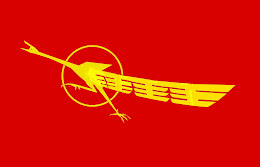





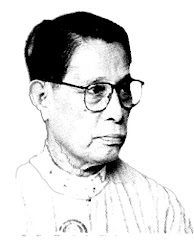


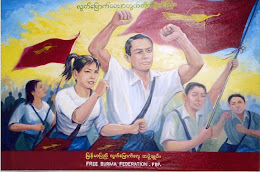





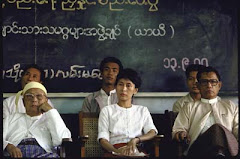

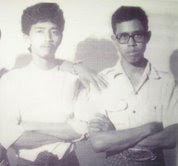

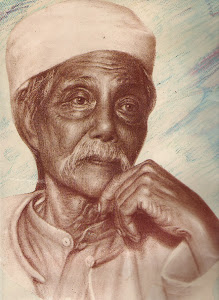
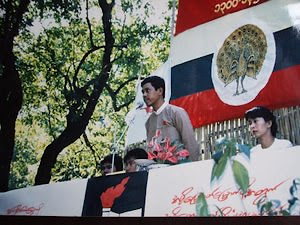
No comments :
Post a Comment